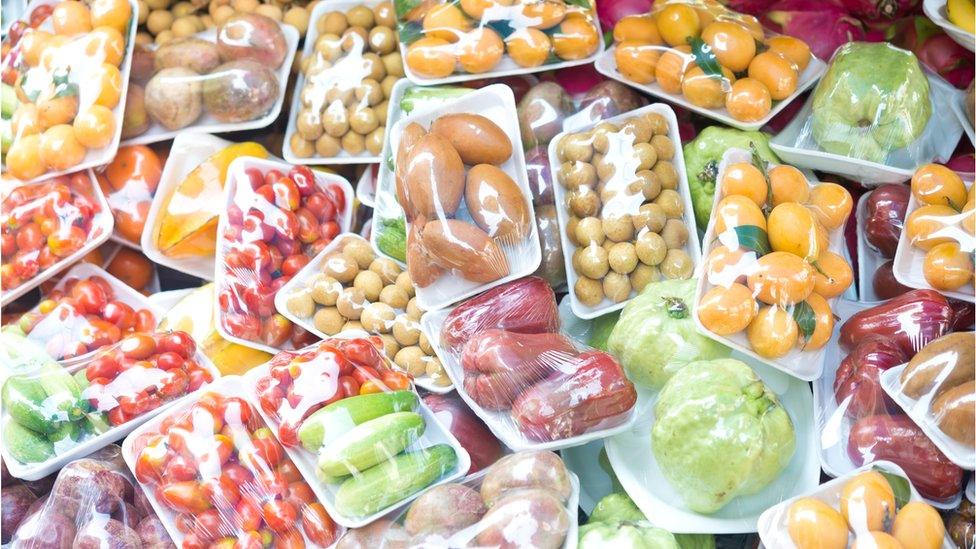Just 20 firms behind more than half of single-use plastic waste - study
- Published
- comments

Traditionally, the biggest use of plastics is in packaging and it tends to be used just once before being thrown away
Just 20 companies are the source of more than half of all the single-use plastic items thrown away globally.
That's the conclusion of analysis of the corporate network behind plastic production.
The study looked at approximately 1,000 factories that make the raw materials needed for single-use products.
Plastic bottles, food packages and bags are among billions of items that are used once and then thrown away, often ending up in the oceans.
The research - carried out by a consortium including the London School of Economics - looked at which companies are at the base of the plastic supply chain, external and make polymers, the building blocks of all plastics.
It names 20 petrochemical companies which it says are the source of 55 per cent of the world's single-use plastic waste. The companies include ExxonMobil, Dow and Sinopec.
The study also assesses which countries generate most single-use plastic waste, based on per head of population.
The UK comes in fourth, with more than 40kg of plastic waste generated per person per year, the authors state, while Australia is top and the United States second.
Part of the increase in demand for plastic stems from the need for masks and other protective and medical equipment to deal with the Covid crisis.
Supply chain focus
Previous research has focused on the impact of plastic waste on the natural world, or on the consumer companies making and selling consumer products packaged in plastic.
By contrast, this analysis tracks the flow of plastic through the supply chain, starting with the manufacturers of the basic ingredients that go into making single use items.
Those ingredients, known as polymers, are mostly produced by processing fossil fuels including oil, gas and coal.
Planet and Plastic: End of the Love Story?
The research was led by Australia's Minderoo Foundation and a consortium including LSE, market researchers Wood Mackenzie and the Stockholm Environment Institute.
US-based ExxonMobil is the biggest producer of single-use plastic, the report says, followed by: Dow, Sinopec, Indorama Ventures, Saudi Aramco, PetroChina, LyondellBasell, Reliance Industries, Braskem, Alpek SA de CV, Borealis, Lotte Chemical, INEOS, Total, Jiangsu Hailun Petrochemical, Far Eastern New Century, Formosa Plastics Corporation, China Energy Investment Group, PTT and China Resources.
According to the foundation's director of finance and transparency, Dominic Charles, the research highlights "how the future of the plastic waste crisis is in the hands of just 20 companies".
He says: "It's an extraordinary point of leverage for regulators, for finance institutions, to influence them in order that rather than producing from fossil fuels, they produce plastic that's recycled."
He adds that until now the emphasis of efforts to curb plastic pollution has been on the individual choices that consumers can make.
"But we need to go after the tap, to turn off the tap of fossil fuel plastics and we need to create plastics from recycled material."
The report finds that plastic production is set to expand by 30% in the next five years, increasing carbon emissions as well as creating more plastic waste.
Throwaway society
One of the contributors is Prof Sam Fankhauser, a specialist in climate change economics at the University of Oxford and the London School of Economics.
He observes: "Our reliance on oil and gas is not only fuelling climate change, but as the primary material used in the production of throwaway plastics also devastating our oceans.
"It is critically important petrochemical companies move towards circular economy-based alternatives if we are going to successfully tackle these interlinked crises.
"The benefits on offer are transformative and hugely beneficial, not only for our environment and ecosystems but also the communities living with the realities of plastic pollution."
The beach cleaners battling a tide of plastic
'Holy grail'
The world's largest producer of plastic polymers, ExxonMobil, says it shares society's concerns about plastic waste.
In a statement, it said: "ExxonMobil is taking action to address plastic waste by increasing plastic recyclability, supporting improvements in plastic waste recovery - for example, through our founding membership in the Alliance to End Plastic Waste - and minimizing plastic pellet loss from our operations.
"We are also working on advanced recycling solutions that create and capture value from plastic waste with opportunities for lower overall greenhouse gas emissions over the full life cycle of the plastic."
Another large polymer producer, Ineos, was also asked for comment.
According to its website, the company is working on ways to chemically recycle plastic, adding that "the holy grail of plastic recycling is fast becoming a reality and will mean we can reduce our reliance on fossil fuels to make our products".
It comes as Greenpeace reported yesterday that plastic waste collected for recycling from British households had been found dumped in Turkey.